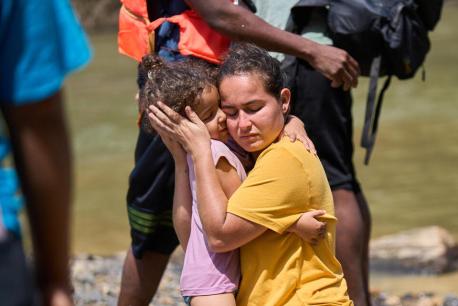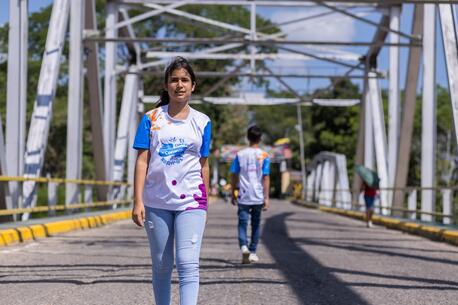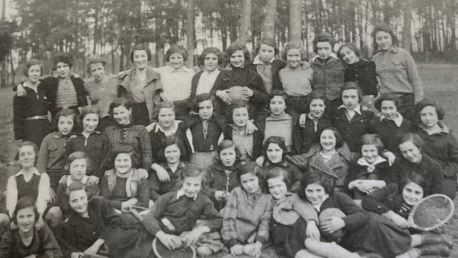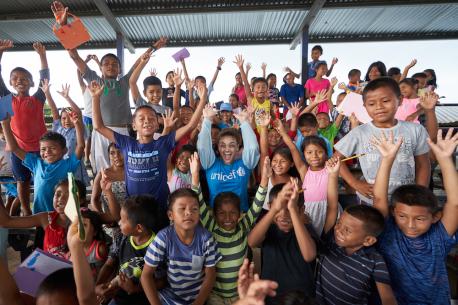
After the Darién Gap: Finding a Space to Heal
When migrating children and families emerge from the treacherous Darién Gap, UNICEF is there to provide support through self-care and child-friendly spaces.
Part of one of the world's most dangerous migration routes, the Darién Gap, a 66-mile swath of dense jungle spanning across Panama and Colombia, has long been used as a pathway for those traveling toward North America in search of safety, security and what many hope will be a better life.
The threat of violence and abuse — including armed assault, mugging and rape — is a constant for those who try to cross the Gap. Yet many do so every day, including small children. Fleeing conflict, climate change and other hardships, migrants make their way to the Gap from countries including Venezuela, Haiti, Ecuador, China and Colombia.
And the number of people setting out to make the perilous trek keeps rising.

An unprecedented number of children are traveling across the Darién Gap — alone
The United Nations estimates that as many as 400,000 migrants may cross the Gap between Colombia and Panama in 2023, a significant increase from approximately 250,000 last year. Children under 5 now represent an estimated 20 percent of those who make the journey.
An unprecedented number of children are now traveling alone, either unaccompanied or separated from their caregivers en route. UNICEF estimates that an average of five children arrived alone daily in Panama during the first two months of 2023. During that same time frame, the total number of children crossing the Darién jungle increased sevenfold compared to the same period in 2022.
Many migrants traveling through the Darién Gap experience environmental and health threats including insect and animal bites, fevers and illnesses made worse by limited access to food and safe water, and injuries due to difficult walking conditions. Unaccompanied children are especially vulnerable to violence, abuse and harsh conditions.

UNICEF child-friendly spaces provide a place for children to be children again
When migrant children and families arrive in Panama via the Darién jungle, UNICEF and partners are there to help. Along with family unification efforts, delivery of safe water and sanitation supplies and administration of first aid and medical services, UNICEF works to provide mental health and psychosocial support.
At a temporary migrant reception station (TMRS) in the indigenous Embera host community of Lajas Blancas in Meteti, Darién, Panama, UNICEF has established child-friendly and self-care spaces to support children on the move and those who have experienced trauma along the way. Approaching the spaces, the joyful sound of children laughing and women talking warmly together offers a stark contrast to the surrounding area, where migrating children and their families, wrung out by their ordeal, may wait for hours, days or even weeks to continue their journeys north.

Exhausted and shaken, women and children arrive in Panama in urgent need of care
On a recent visit to Darién, I watched as children and adults alike crowded into the TMRS in Lajas Blancas after arriving by canoes from another nearby station. Many carried their only possessions in backpacks or trash bags over their shoulders; others had no shoes, having lost them in the merciless terrain of the jungle. At one point, a young boy pointed to my sneakers and asked in Spanish if he could have them.
Some of the youngest children in diapers had been wearing them for days, the cartoon patterns on the soft fabric faded, the tabs knotted after losing their adhesion. Others made the trip with hardly any clothing at all, their skin vulnerable to Panama’s intense sun and humidity.
Open defecation is a common occurrence here — and one that threatens the health of the host community and all those traveling through it. Riding into Lajas Blancas, we passed a young boy defecating on the dirt road leading toward the station. His mother, presumably, stood beside him, crying.
Witnessing the look of exhaustion and discomfort on young children’s faces was difficult; seeing it in the faces of their older siblings — teens and adolescents — even more so. On a few occasions, I saw young teens holding their little siblings’ hands tightly, trying to stop themselves from crying. I remember thinking that these are the children who will remember this most, who will carry this experience with them for the rest of their lives.

UNICEF establishes child-friendly spaces (CFS) during emergencies to help support and protect children, offering them places to play, learn and heal. At the CFS in Lajas Blancas, opened by UNICEF in 2020 to meet the needs of the growing numbers of people traveling through the Darién Gap, children who have made the trek through the jungle can find relief — and a space to simply have fun and be children again.

For kids who have so many differences including age and native language, play is universal. Children in this CFS come together to play with toys, draw and color, read, listen to books and more. The bright, colorful space is a true refuge for children who have spent days or weeks on the move.
UNICEF and partners help migrants heal and recover through self-care space activities
Next door to the CFS in Lajas Blancas is a self-care space (SCS). Established in 2022, the site is set up to help people of all ages access resources and tools for protecting their well-being, building empowerment and resilience, and seeking psychosocial guidance.

In a series of short workshops, those who visit the SCS are encouraged to connect with one another and begin the healing process, together. One workshop called "Letters" invites participants to share their migrant experience in writing.

Another workshop offers participants a place to connect while freshening up with basic hygiene products and self-care activities like hairstyling — simple actions that can have a meaningful impact when it comes to feelings of self-worth, positive mental health and building the resilience needed to continue on their journeys.
This SCS is particularly important for survivors of gender-based violence. Trained staff provide information and referrals for health services and work with survivors to help support their rights and protections.

One mother shares her story: "I felt lost on that mountain"
Yuri Castillo left Ecuador with her two youngest daughters and crossed the Gap over four and a half harrowing days, walking 6 a.m. to 6 p.m. "It was an ugly experience," she says. "Because I felt lost on that mountain ... In other words, I won't do it again and if I have to go through the jungle, I won't go there again."
In the video below, she shares her story, and explains how the self-care space has helped her find strength for the next step of her journey.
No matter where they come from or where they're going, children on the move must be protected and respected. UNICEF's child-friendly and self-care spaces in Darién help ensure that migrant children and their parents are better supported during their journeys.
For every person on the move, respect, protection and assistance
UNICEF works worldwide to ensure that every child is healthy, educated, protected and respected — no matter where they come from or where they are going. Your 100 percent tax-deductible donation will help UNICEF reach children with the support and services they urgently need. Please donate.
HOW TO HELP
There are many ways to make a difference
War, famine, poverty, natural disasters — threats to the world's children keep coming. But UNICEF won't stop working to keep children healthy and safe.
UNICEF works in over 190 countries and territories — more places than any other children's organization. UNICEF has the world's largest humanitarian warehouse and, when disaster strikes, can get supplies almost anywhere within 72 hours. Constantly innovating, always advocating for a better world for children, UNICEF works to ensure that every child can grow up healthy, educated, protected and respected.
Would you like to help give all children the opportunity to reach their full potential? There are many ways to get involved.





